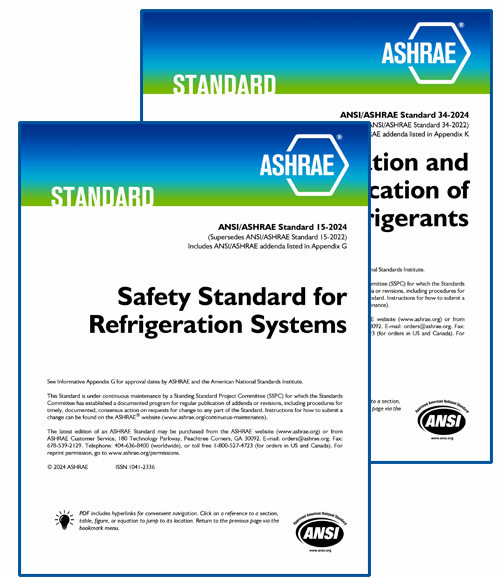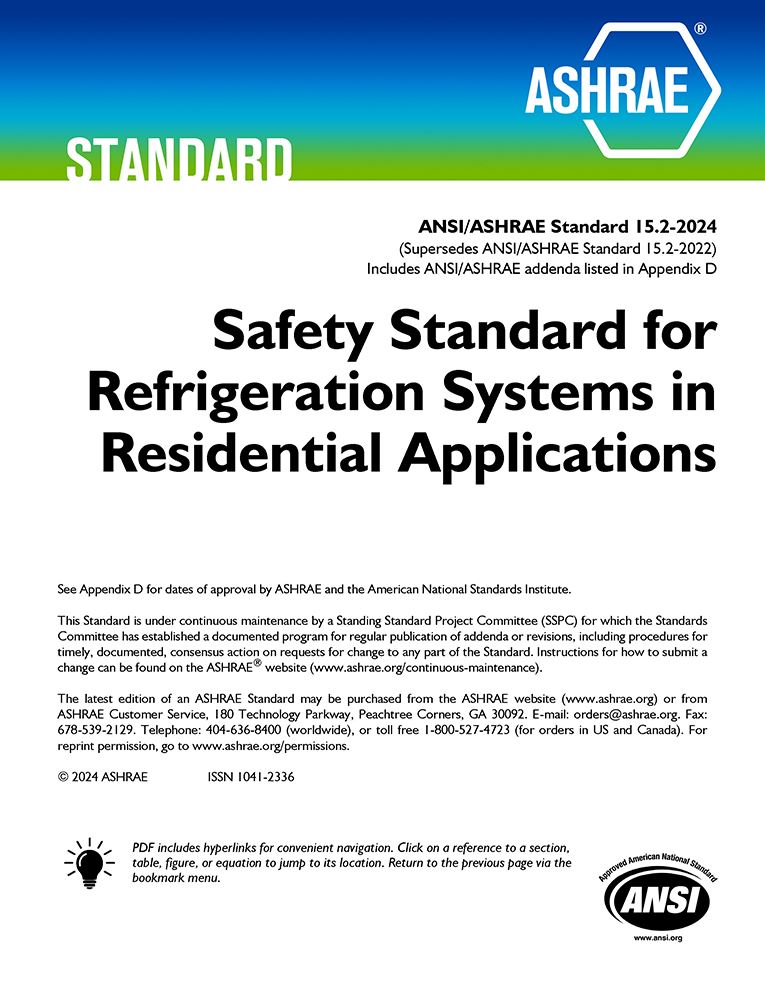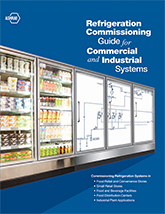ANSI/ASHRAE Standard 15, Safety Standard for Refrigeration Systems and ANSI/ASHRAE Standard 34, Designation and Safety Classification of Refrigerants

ASHRAE’s key standards guiding refrigerant identification and usage have been revised to meet governmental regulation and achieve improved performance. Standards 15 and 34 provide essential guidance to manufacturers, design engineers and operators who need to stay current with new air conditioning and refrigerating requirements.
Standard 34 describes a shorthand way of naming refrigerants and assigns safety classifications based on toxicity and flammability data, while Standard 15 establishes procedures for operating equipment and systems when using those refrigerants.
ASHRAE offers the standards as a set.
PURCHASE
ASHRAE Standard 15 specifies requirements for the safe design, construction, installation, and operation of refrigeration systems.
What’s New in Standard 15-2024
- Revisions to clarify intent and requirements related to pressure relief devices
- Clarification on specific requirements that have precedence over general requirements (consistent in approach with model codes)
- Updated values of conversion factors for use in the calculation of effective dispersal volume charge (EDVC) and addition of equations to calculate conversion factors for other refrigerants not included in Table 7-3
- Clarification of the intent for determination of EDVC limits
- Consistency on the use of relative molar mass throughout the standard
- Better definition of the connection between Standards 15 and 34 with respect to use of LFL, OEL, and RCL
- Modification of requirements for handling, transportation, and storage of flammable refrigerants based on recommendations from ASHRAE RP-1807
- Permits use of Section 8.9.6 ventilation airflow rates where explosion-proof electrical equipment is chosen as a compliance path, allowing ignition-source engineering controls to be the primary means of risk management for Class 2L refrigerants
ASHRAE Standard 34 establishes a uniform system for assigning reference numbers, safety classifications, and refrigerant concentration limits to refrigerants. The standard also identifies requirements to apply for designations and safety classifications for refrigerants and to determine refrigerant concentration limits. Safety classifications based on toxicity and flammability data are included along with refrigerant concentration limits for the refrigerants.
What’s New in Standard 34-2024
- Twenty-eight refrigerants added
- Burning velocity data added for flammable refrigerants
- Delineation of designation numbering of zeotropic refrigerant blends following the assignment of R-499A
- Revisions to allow further alignment with ISO Standard 817, including updating the definition of occupational exposure limit (OEL), clarifying toxicity data, and revising application requirements
- Added to or revised toxicity values for R-50, R-1150, and R-1270
- Expanded refrigerant numbering descriptions of the ethane series to also incorporate the ethene series
- Ethers and cyclobutene added to the list of substances which can be explicitly determined from the refrigerant numbers
- Added clarification on the allowable pressure range for flammability testing
- Revised composition tolerances for components of refrigerant blends
ANSI/ASHRAE Standard 15.2-2022, Safety Standard for Refrigeration Systems in Residential Applications (ANSI Approved)

ASHRAE Standard 15.2 is the low-rise residential refrigeration safety standard that all stakeholders can depend on.
Standard 15.2 is designed to accommodate the use of A2L-classifi ed refrigerants in low-rise residential applications and is intended for use by manufacturers, installers, contractors, service technicians, building code officials, and others.
Specific requirements are included for which refrigerants can be used, the maximum allowable refrigerant charge, accessories, and interconnecting piping, so that in the event of a full release of the refrigerant charge, the concentration in the space remains safely below the lower flammability limit of the refrigerant.
Purchase
What’s New in Standard 15.2-2024
- Updated with the latest requirements and aligned with the current edition of UL/CSA 60335-2-40 in anticipation of January 1, 2025 restrictions on refrigerant GWP levels in the United States that will lead to the introduction of A2L refrigerants in all of systems covered by this standard
- Expanded scope to apply to both direct and indirect refrigeration systems in residential applications
- Updated formulas adding the gravity equation from the fourth edition of UL 60335-2-40
- R-1234yf added to applicable tables
- Revised equations to correct the calculator used to determine refrigerant density correction factors
- Revised maximum permissible inductive load values for R-452B, R-454A, and R-454B using latest measurements of burning velocity as required by UL 60335-2-40
Other Refrigeration Resources
Refrigeration is critical for industrial processes, food storage, and medical applications and the cooling cycle lies at the heart of air conditioning. Expert guidance is essential.
Refrigeration Commissioning Guide

The Essential Guide for Commissioning Refrigeration Systems
The first of its kind, Refrigeration Commissioning Guide for Commercial and Industrial Systems provides guidance to owners and managers of commercial and industrial facilities that use refrigeration systems to help ensure that project requirements are met and owners' expectations are achieved.
Learn More
UNEP/ASHRAE Refrigerant Factsheet
The purpose of this fact sheet is to provide an update on ASHRAE standards for refrigerants and to introduce the new refrigerants that have been awarded an "R" number over the last few years and introduced into the international market.
 Update on New Refrigerants Designations and Safety Classification (July 2024)
Update on New Refrigerants Designations and Safety Classification (July 2024)
Translations:  Spanish
Spanish  French
French  Russian
Russian
Also Available:
McGraw-Hill- Industrial Refrigeration Handbook
Related Courses
The Future of Refrigerants: Challenges and Opportunities (MENA)
Variable Refrigerant Flow System Design & Application
Variable Refrigerant Flow Systems: Design & Applications (MENA)